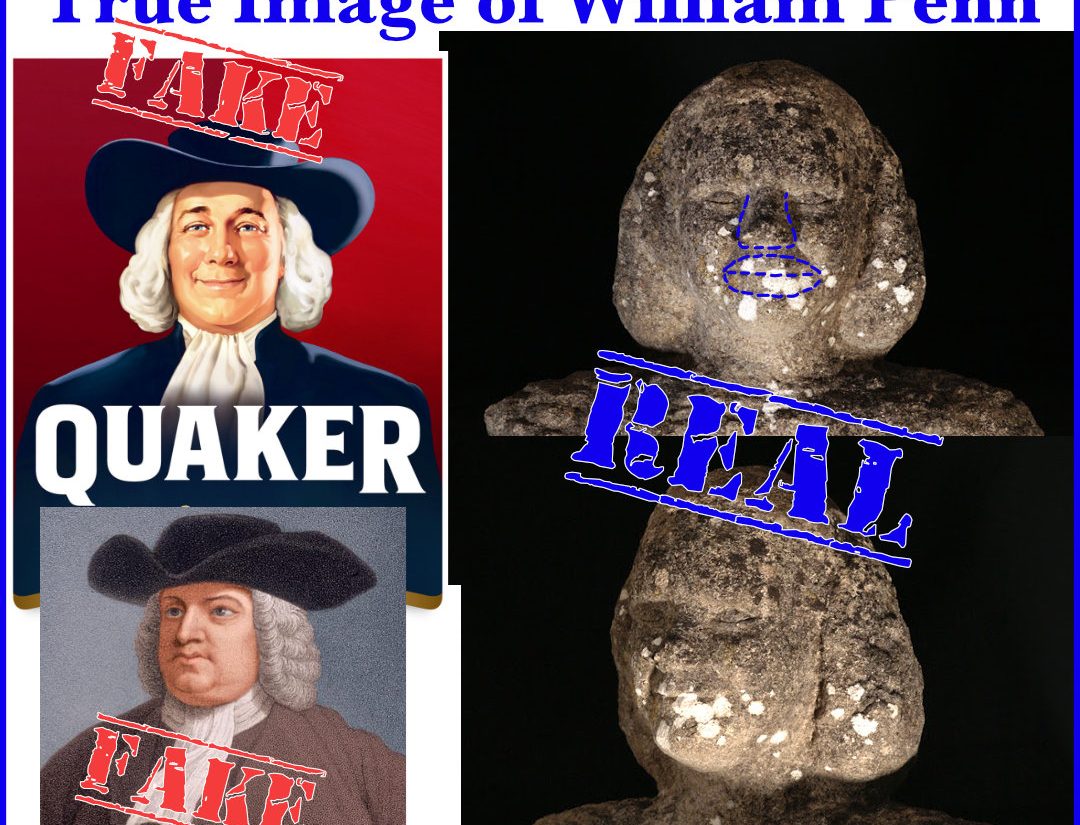William Penn – Founder Of Pennsylvania & the Quakers Hidden Monument Found His Facial Features Are NOT Caucasian
- Guinevere Jackson
- 25 December 2022
- 0 Comment

The original bust of William Penn that dates to the time when he was alive was found in the United Kingdom. I pulled it from the Internet a few years ago, and I can recall the article saying that the bust was hidden but was made when William Penn was alive. Now it is nowhere to be found, and the Internet has scrubbed it from their records. Please let me know if anyone can tell me where and who the once-lost but found but now lost again original bust of Penn is.
It is important to understand that during the 17th century, the ruling class were so-called BLACK men. I have proven on this website that the dark British monarchy founded America.
William Penn was an English Quaker best known for founding the colony of Pennsylvania as a place for religious freedom in America.
William Penn (October 24 October 14 1644 – August 10, July 30 1718] 1718) was an English writer and religious thinker belonging to the Religious Society of Friends (Quakers) and founder of the Province of Pennsylvania, a North American colony of England. He was an early advocate of democracy and religious freedom, notable for his good relations and successful treaties with the Lenape Native Americans.
Who Was William Penn?
William Penn was the son of an admiral and landowner and was educated in theology and the law. In his twenties, he converted to the Quaker religion and was jailed several times for resisting the Church of England. In 1681, he received a royal charter to form a new colony in America, to be named Pennsylvania; he envisioned this territory as a peaceful refuge for members of all religious beliefs.
Early Life and Education
William Penn was born in London, England, on October 14, 1644. His father, Sir William Penn, was an admiral and landowner who Charles II had knighted; his mother, Margaret Jasper Vanderschuren, was the daughter of a merchant.
Penn was educated at Chigwell School in Essex; he entered Christ Church College (University of Oxford) in 1660 but was expelled for criticizing the Church of England. His father sent him to France, where he studied theology at the Protestant Academy in Saumur. When he returned to England in 1664, he briefly studied law.
Religious Beliefs and Persecution
Penn travelled to Ireland to manage some of his father’s property, and it was there that he came into contact with Quaker preachers who inspired him to join their faith. Following his conversion to the Society of Friends, Penn began to fight for greater freedom for this marginalized and frequently persecuted religious group.
In the late 1660s, Penn wrote several works about his new religious beliefs, beginning with The Sandy Foundation Shaken (1668), which questioned several basic Protestant doctrines. He was jailed for blasphemy in the Tower of London as a result of this publication. While imprisoned, he wrote No Cross, No Crown, another avowal of his faith. He was released in 1669 and continued promoting the Quaker teachings of self-denial and social reform. Penn was arrested further on charges of illegal preaching and inciting a riot. He also made missionary trips throughout England and to Holland and Germany.
Founding of Pennsylvania
By the 1670s, Penn had become a figure of importance in the Quaker community. In 1675, he was asked to resolve a land dispute between Quaker property owners in the American colony of West New Jersey. After settling the dispute, using his legal knowledge and leadership skills, he was chosen to organize the founding of a Quaker colony in America.
Penn petitioned King Charles II for additional land west of the Delaware River, and he received a charter for this territory in 1681. He was made proprietor and governor of the new colony, which the king titled “Pennsylvania,” and he moved there in 1682. He immediately began to direct this “holy experiment” by planning the new colony’s government, writing its constitution, distributing land to settlers and establishing positive, peaceful relations with the local Indians. Penn’s Letter to the Free Society of Traders (1683) was an account of his early activities in Pennsylvania.
In some ways, Pennsylvania was a quick success: It attracted many Quakers from England and Europe, as well as members of other groups seeking religious tolerance. However, the colony was also beset by financial troubles, border disputes and political conflict. In 1684, Penn returned to England, where his fortunes rose and fell with changes in royal rule. He lived in Pennsylvania again between 1699 and 1701 and revised its constitution during that time; after this stay, he resided in England for the rest of his life, leaving the colony under the management of his secretary, James Logan, and various deputy governors.
Later Years and Death
In 1696, Penn married his second wife, Hannah Callowhill, with whom he had seven children (his first wife died in 1694). His wife assisted him in his proprietorship of Pennsylvania in his later years, especially after his stroke in 1712. Penn died in Ruscombe, in Berkshire, England, on July 30, 1718.
“Men must be governed by God or they will be ruled by tyrants.”
William Penn
Citation: William Penn. (2022, December 15). In Wikipedia. https://en.wikipedia.org/wiki/William_Penn – Author Biography.com Editors and True Race Facts – Website Name The Biography.com website URL https://www.biography.com/political-figure/william-penn Access Date 25 December 2022 – Publisher A&E Television Networks – Image released to you under a Creative Commons Attribution-NonCommercial-ShareAlike 4.0 International (CC BY-NC-SA 4.0) license.
 Donate
Donate